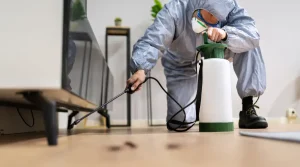Bed bugs are more than just a nuisance; they can lead to legal, financial, and emotional stress for tenants and landlords alike. Understanding the legal framework in California can help both parties address infestations effectively and maintain habitable living conditions.
Key Takeaways
- Bed bug infestations in California involve legal responsibilities for both landlords and tenants.
- Landlords must ensure rental properties are habitable and free from bed bugs, covering extermination costs unless tenants are proven to be responsible.
- Tenants should promptly report issues, follow treatment protocols, and avoid introducing pests into the rental property.
- Professional pest control services are essential for effective bed bug elimination.
Landlord Responsibilities Regarding Bed Bugs in California
California law places a significant burden on landlords to maintain habitable rental properties. Bed bug infestations fall under this responsibility, requiring landlords to take proactive and reactive measures.
1. Inspection Obligations Landlords must regularly inspect their properties to detect bed bugs early. This includes:
- Inspecting units before new tenants move in.
- Conducting periodic checks during tenancy, particularly in multi-unit buildings where infestations can spread quickly.
2. Responding to Complaints When tenants report bed bugs, landlords must act promptly. Delays can worsen infestations, potentially leading to tenant claims of negligence. A quick response should include professional evaluation and treatment.
3. Disclosure Requirements California law requires landlords to inform prospective tenants of any known bed bug issues. Transparency builds trust and allows tenants to make informed decisions about renting.
4. Financial Responsibility Landlords are generally responsible for extermination costs. Professional pest control services must be engaged to resolve infestations and ensure follow-up treatments to prevent recurrence.
When Tenants Might Be Responsible for Bed Bugs
While landlords usually bear the cost of extermination, tenants may sometimes be held accountable for infestations due to specific actions or negligence.
1. Failure to Report Timely Tenants are responsible for promptly reporting any signs of bed bugs. Delays can worsen infestations, increasing treatment costs.
2. Introducing Infested Items If a tenant brings in infested furniture, luggage, or other belongings, they might be liable for the resulting infestation. Proof of the source is crucial in these cases.
3. Non-Compliance with Treatment Tenants must often prepare their living spaces for extermination treatments. This may include:
- I was washing and bagging clothing and linens.
- I am decluttering to allow thorough extermination. Failure to comply can reduce the effectiveness of treatments and lead to additional costs for follow-up services.
Choosing a Professional Bed Bug Exterminator
Effectively addressing a bed bug infestation requires professional expertise. Here are key considerations for selecting an exterminator:
1. Credentials and Experience
- Look for exterminators specializing in bed bug treatments.
- Verify licenses and certifications to ensure compliance with industry standards.
2. Comprehensive Assessment
- A reputable exterminator will conduct a thorough inspection of the property.
- They should provide a detailed treatment plan that includes the methods to be used, the expected timeline, and follow-up visits.
3. Use of Integrated Pest Management (IPM)
- IPM combines chemical and non-chemical approaches, such as heat treatments, to maximize effectiveness while minimizing environmental impact.
4. Cost Comparisons
- Obtain quotes from multiple exterminators to evaluate pricing and included services.
- Ensure quotes cover all stages of treatment and any necessary follow-ups.
5. Guarantees and Post-Treatment Support
- Many exterminators offer guarantees for their services, ensuring peace of mind for landlords and tenants.
- Follow-up inspections and treatments may be included to confirm complete eradication.
Frequently Asked Questions (FAQ)
1. What should tenants do if they suspect bed bugs in their rental unit?
Tenants should immediately report suspected bed bug infestations to their landlord. Quick action helps prevent the infestation from worsening and spreading to neighboring units.
2. Are landlords required to hire professional exterminators for bed bug treatments?
California law generally requires landlords to engage professional pest control services to address infestations. DIY treatments may not be sufficient to ensure long-term eradication.
3. Can a landlord charge a tenant for bed bug extermination?
Typically, landlords cover extermination costs. However, if a tenant is proven to have caused the infestation through negligence or the introduction of pests, they may be held financially responsible.
4. How can tenants protect themselves from bringing bed bugs into their rental units?
- Inspect secondhand furniture and luggage before bringing them home.
- Use protective covers on mattresses and box springs.
- Avoid placing luggage on hotel beds or floors during travel.
5. What happens if a landlord refuses to address a bed bug infestation?
Tenants may have legal recourse if a landlord neglects their responsibility to address a bed bug problem. Options include:
- Filing a complaint with local housing authorities.
- Withholding rent until the issue is resolved, though this must comply with state laws.
- Seeking legal action for uninhabitable living conditions.
6. Are tenants required to leave their rental units during treatment?
Extermination methods, such as chemical or heat treatments, may require tenants to vacate temporarily. The exterminator or landlord should provide clear instructions.
7. Can bed bugs spread between units in a multi-unit building?
Bed bugs can travel through walls, electrical outlets, and shared spaces, making early detection and treatment crucial in apartment complexes.
Preventing Bed Bug Infestations: Tips for Tenants and Landlords
For Tenants:
- Regularly inspect bedding, furniture, and luggage for signs of bed bugs.
- Avoid purchasing used mattresses or upholstered furniture without a thorough inspection.
- Report any issues to the landlord promptly.
For Landlords:
- Conduct regular property inspections, especially in multi-unit buildings.
- Provide tenants with information on preventing and identifying bed bug infestations.
- Address infestations immediately with professional services to prevent widespread problems.
Conclusion
Bed bug infestations require a collaborative approach between landlords and tenants to ensure effective resolution. Landlords must maintain habitable properties and act promptly when infestations arise, while tenants play a critical role in prevention and timely reporting. Engaging professional exterminators is essential to eliminate bed bugs and uphold living conditions. By understanding their rights and responsibilities, both parties can navigate the challenges of bed bug infestations effectively and legally.
Take the first step toward a pest-free home! Poway Pest Control offers reliable, affordable solutions tailored to your needs. Call now to schedule your FREE inspection and protect your home today!






